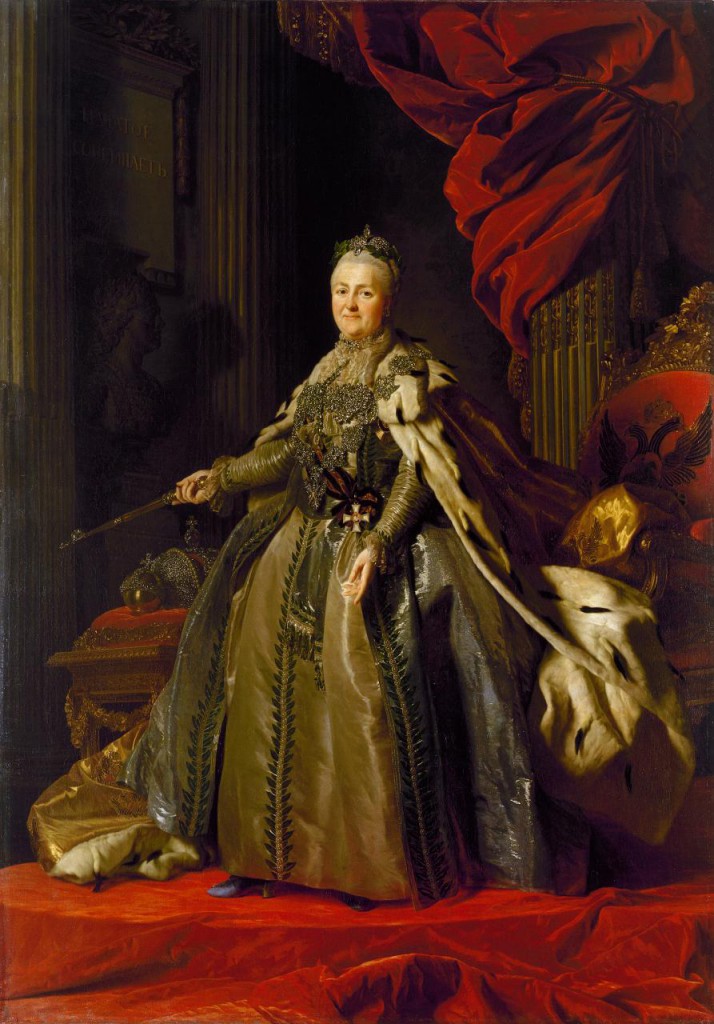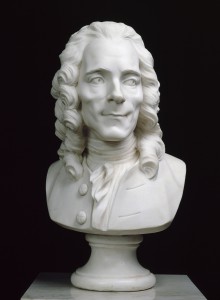
Alexander Roslin
Swedish 1718–1793
Portrait of Catherine II 1776–77
oil on canvas
271.0 x 189.5 cm
The State Hermitage Museum, St Petersburg
Acquired, 1918 (Inv. № ГЭ-1316)
In conjunction with the current NGV exhibition Masterpieces from the Hermitage: The Legacy of Catherine the Great the NGV is presenting a series of lectures on Philosophy, Literature and Catherine the Great.
Catherine the Great’s intellectual pursuits extended far beyond her collection of art. Exchanging letters over a fifteen year period with French writer, historian and philosopher Voltaire, she was spurred to bring Russia into the modern era through ideas raised by the Enlightenment and its supporters. Patronage of the arts and education, as well as economic achievements, led to Catherine’s reign being cited as the golden age of Russia. In this special series of four lectures, specialists of history, philosophy and literature explore this rich period through the lens of the philosophers and writers of the time.
Sunday 6 September, 2pm | Catherine La Grande, Empress and Autocrat of all the Russias
German-born Catherine ruled the huge Russian Empire from her study in the Hermitage for nearly 40 years. Embracing the 18th century European explosion of science and reason (spearheaded by the French philosopher Voltaire) as Russia’s path to Enlightenment, her patronage of art and culture was unparalleled in Russia. Her political practices, however, remained fixed in tradition. This lecture will examine the fascinating, contradictory facets of a brilliant despot.
Speaker Associate Professor Judith Armstrong, School of Languages and Linguistics, Faculty of Arts, The University of Melbourne

Marie-Anne COLLOT, French 1748–1821, Voltaire (1770s),, marble, 49.0 x 30.0 x 28.0 cm, The State Hermitage Museum, St Petersburg (Inv. no. Н.ск. 3) Acquired from the artist, 1778
Sunday 20 September, 2pm | Catherine II in her International Context
For Voltaire and others, she personified their hopes in the actions of ‘enlightened monarchy’. At the same time, she was constrained by the realities of both international power politics and the nature of Russian society. During her long reign Catherine developed an extraordinarily ambitious reformist vision for Russia, including the priority she gave to the arts, education, a form of consultative government, as well as imperial expansion. Explore her relationship with Voltaire and, indirectly, the broad currents of the European ‘Enlightenment’ in this lecture.
Speaker Emeritus Professor Peter McPhee, Melbourne Centre for the study of Higher Education, The University of Melbourne
Sunday 4 October, 2pm
Catherine the Great and the Russian Writers of the 18th Century
During Catherine’s reign, the Russian court was ripe with ideas of European Enlightenment and formed a hub for European writers, philosophers, artists, master craftsmen and architects. Yet the monarch did not value Russian writers of the time. Many Russian writers adopted European literary models and genres, however they also developed their own new language of critique and representation of Russian life, which was unique and original, while still being influenced by the European Enlightenment. Catherine’s reign provided a beneficial context for such modernisation of Russian national discourse but it was by no means the intended effect. This lecture will explore the state of Catherine’s Russia as represented by three major Russian 18th century writers: Radishchev, Fonvizin and Karamzin.
Speaker Associate Professor Millicent Vladiv-Glover, School of Languages, Literatures, Cultures and Linguistics, Monash University
Sunday 18 October, 2pm
Enlightenment, Civic Identity and the Progress of the Human Species
What was the role of the arts and sciences in propelling humanity into a brighter future? And how was it possible that the attempt to answer this question resulted in a fierce dispute between Rousseau, D’Alembert and Voltaire? Central to this debate was a profound concern about the educational value of art, and more specifically the moral effects of the theatre with Rousseau famously argueing that the introduction of Voltaire’s theatre to Geneva would be disastrous. In this lecture Dr Anik Waldow will extend Catherine’s interest in the Enlightenment into the discussion of some of the key themes around which French enlightenment thought revolved.
Speaker Dr Anik Waldow, School of Philosophical and Historical Inquiry, University of Sydney
